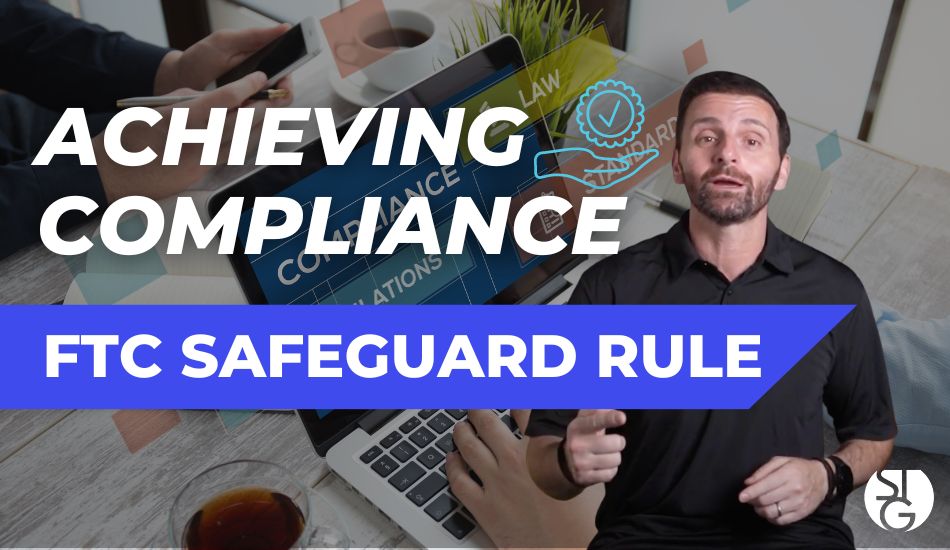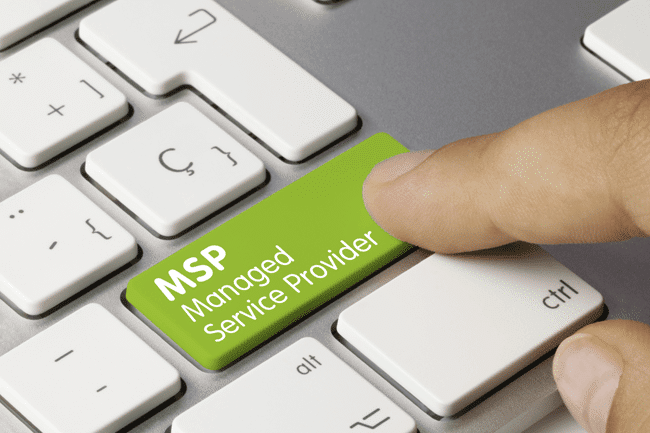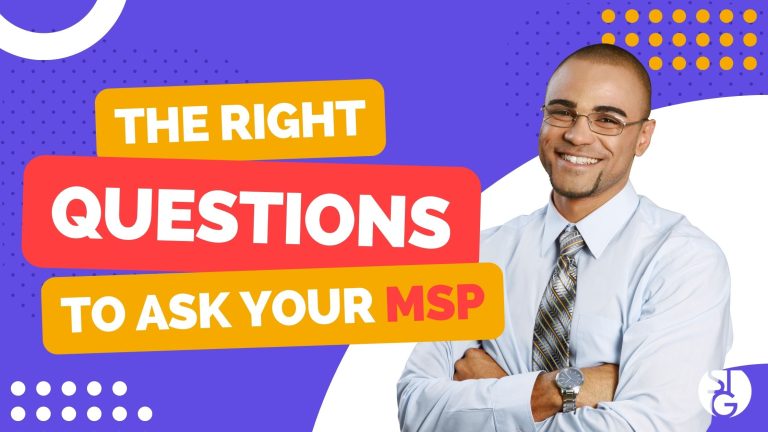Is your business achieving compliance with the new FTC Safeguards Rule? Only one way to find out. Let’s get into it.
As a Managed Service Provider (MSP) for financial institutions, we often work closely with clients who value the significance of data protection. Which is why they must remain in compliance with any new rules and regulations.
In today’s post, we’ll be breaking down the importance of this new FTC Safeguards Rule.
What Is the FTC Safeguards Rule
The FTC Safeguards Rule is a regulation from the Federal Trade Commission (FTC) that requires financial institutions to protect their customers’ data. The rule was updated to strengthen these security requirements and ensure companies maintain a robust security program.
Who Must Comply?
The rule applies to a broad range of businesses that are considered “financial institutions” under the FTC’s jurisdiction. This includes not only banks but also mortgage brokers, auto dealerships, tax preparation companies, credit counselors, payday lenders, collection agencies, and accountants. If a business handles customer financial information, it likely falls under this rule.
Key Requirements of the Updated Rule
The new rule mandates specific security measures, moving beyond a general requirement for a security program. Covered companies must:
- Appoint a Qualified Individual: Designate an employee or a third party to oversee and enforce the security program.
- Conduct a Written Risk Assessment: Perform a formal, documented assessment to identify internal and external threats to customer information.
- Implement Specific Safeguards: Put specific security controls in place, including:
- Access Controls: Limit access to customer data to only those who need it.
- Encryption: Encrypt customer information when it is stored and when it is being transmitted.
- Multi-Factor Authentication (MFA): Require MFA for anyone accessing customer information on the system.
- Secure Disposal: Securely delete customer information no later than two years after its last use, with exceptions for legitimate business or legal needs.
- Change Management: Evaluate security risks that arise from changes in IT systems.
- Maintain an Incident Response Plan: Create a written plan to respond to and recover from security events.
- Train Employees: Provide security awareness training to all staff.
- Oversee Service Providers: Ensure that any third-party providers with access to customer data also have adequate security measures.
Breach Notification Requirement
A significant addition to the rule is the mandatory breach notification. As of May 13, 2024, covered companies must report data security breaches to the FTC.
- Reporting Threshold: You must report a security event if unencrypted customer information for 500 or more people is acquired without authorization.
- Reporting Deadline: The report must be submitted to the FTC as soon as possible, but no later than 30 days after you discover the breach.
- Required Information: The notification must include the company’s contact information, a description of the data involved, the date of the event, and the number of affected individuals.
The new Safeguards Rule holds a wide range of financial institutions accountable for protecting consumer information and requires transparency in the event of a breach.
Understanding the New FTC Safeguard Rule
Before exploring the details, let’s take a moment to understand what the FTC Safeguard Rule entails.
The Federal Trade Commission (FTC) developed this rule to ensure businesses establish reasonable security measures to protect the personal information of their clients.
The rule applies not only to financial institutions but to all businesses handling sensitive data.
It emphasizes the need for a comprehensive information security program to safeguard client information.
Challenges of Achieving Compliance
Achieving compliance with the FTC can be challenging for many businesses.
Identifying and addressing vulnerabilities, conducting risk assessments, and implementing proper security measures can be complex and time-consuming.
You also have to regularly update the company with evolving cybersecurity threats and regulations. That alone poses an ongoing challenge for businesses of any size.
Implementing an Effective Compliance Program
Now that we understand the importance of compliance with the FTC Safeguards Rule, let’s explore some key objectives and strategies for implementing an effective compliance program.
Objective 1: Ensure the Security of Customer Information
Businesses must implement robust security measures in order to protect customer information from unauthorized access or breaches.
This can include encryption, strong access controls, secure network infrastructure, and regular security assessments.
Objective 2: Implement Safeguards Against Anticipated Threats
Businesses must stay proactive by identifying potential threats to customer information and implementing the appropriate safeguards.
Objective 3: Prevent Unauthorized Access to Information Systems
Unauthorized access to information systems poses a significant risk to customer data.
To prevent this, businesses should enforce strict access controls, implement multi-factor authentication, and regularly audit and monitor access privileges.
How an MSP Supports Compliance
This is where partnering with a trusted Managed Service Provider becomes invaluable.
As an MSP, we specialize in helping businesses achieve compliance with the FTC and this new Safeguards Rule.
Here’s what we do to help:
Risk Assessment:
We conduct thorough risk assessments, identifying vulnerabilities within your systems and processes to address them effectively.
Tailored Security Solutions:
We develop and implement a customized information security program aligned with the FTC Safeguards Rule, ensuring your business meets compliance requirements.
Proactive Monitoring:
Our team provides continuous monitoring and advanced security measures to detect and mitigate potential threats, safeguarding your clients’ data.
Incident Response:
In the unfortunate event of a security breach, we have robust incident response procedures in place to minimize the impact and restore normal operations swiftly.
Expert Guidance:
Our experienced technicians stay updated with the latest cybersecurity practices and regulations, providing you with expert guidance throughout your compliance journey.
Benefits of Partnering with an MSP
Now, let’s discuss why your company would benefit from partnering with an MSP like us to handle your compliance.
Enhanced Data Protection:
Our MSP services ensure comprehensive protection of your client’s sensitive information, minimizing the risk of data breaches and unauthorized access.
Focus on Core Competencies:
By outsourcing compliance efforts to an MSP, you can focus on your core business activities while entrusting data protection to the experts.
Cost-Effectiveness:
Engaging with an MSP eliminates the need for substantial investments in specialized resources, technologies, and training. Which results in cost savings.
Achieving compliance with the new FTC Safeguards Rule is crucial for businesses that handle customer information.
By partnering with a trusted MSP like us, you gain access to expert guidance, tailored solution, and ongoing support to achieving compliance with the new FTC Safeguard Rule.
Check out our last video! ➡️ Why Every A/E/C Business Should Outsource IT
If you have any questions or would like to learn more about compliance, feel free to set up a call with one of our expert technicians via the Calendly link below. We’d be happy to discuss solutions with you.
STG IT Consulting Group proudly provides IT Services for Small to Medium Businesses in Greater Los Angeles. We’d love to see if we can help you too!




